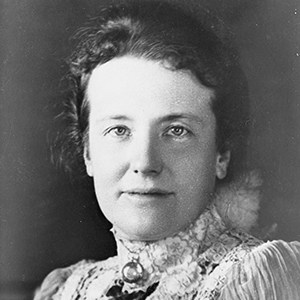Edith Roosevelt was the second wife of President Theodore Roosevelt. She served as First Lady of the United States from 1901-1909.
Early Life
Edith was born in Connecticut in 1861 and raised in New York City. As a young child, Edith was a frequent playmate of Theodore Roosevelt’s younger sister Corinne. She also attended Miss Comstock’s “finishing” school and developed a lifelong love of books.
As teenagers, Edith and Theodore Roosevelt were close; however, they grew apart before he left for Harvard College. Once there, he fell in love with Alice Hathaway Lee and later married her. Alice died in 1884, leaving Roosevelt a widower with an infant child. Edith and Theodore later renewed their relationship, culminating in their 1886 marriage in London. Together, they had five of their own children: Theodore (1887), Kermit (1889), Ethel (1891), Archibald (1894), and Quentin (1897).
First Lady
As Theodore Roosevelt rose to political power, Edith largely remained out of the spotlight, electing to focus on her family. After William McKinley’s assassination, Edith assumed the duties of the First Lady. During her husband’s administration, Edith oversaw a significant renovation of the White House. She was also the first First Lady to hire a social secretary and created the White House China Collection and the First Ladies’ Portrait Gallery. A White House aide aptly described the First Lady as “always the gentle, high-bred hostess; smiling often at what went on about her, yet never critical of the ignorant and tolerant always of the little insincerities of political life.”
Later Life
After Theodore’s death in 1919, Edith traveled frequently, writing about her travels in Cleared for Strange Ports. She wrote about her family in American Backlogs, but destroyed her lifetime’s worth of love letters from Theodore Roosevelt to protect their privacy.
Edith largely stayed out of politics. However, she campaigned briefly for Herbert Hoover during his 1932 presidential reelection campaign, largely to clarify that her nephew-in-law, Franklin D. Roosevelt, was not her son.








